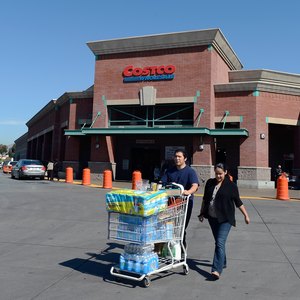
Whether you're running a business or managing a household, saving money on regular purchases is welcome, and buying in bulk can be an effective strategy for doing so. Making the most of volume purchases has challenges, such as storage and inventory management, but potential advantages include cost control, flexibility and environmental responsibility. Reviewing some of the benefits and advantages of bulk buying will help you decide if and when to try this cost-saving tactic.
Read More: 5 Automatic Savings Apps to Help You in 2020
Cost Savings at Home
Foods and other goods sold in bulk when they're on sale saves you lots of money over buying items at full price, one at a time, points out Food Stamp Challenge.com. Many items sold in bulk are generics, which means there's no need for packaging materials or design, which add to the cost of packaged goods.
You can avoid paying a premium for advertising tactics, such as those used by spice manufacturers that supply stores with racks to encourage use of their products in coordinated jars. Even when a bulk alternative is more expensive, you can control costs by purchasing only what you need, rather than an arbitrary package size that leads to product waste.
The advantages and disadvantages of buying food in bulk include low costs and more waste if you don't eat your items by the expiration date. If you plan your use of different items properly, you should have no problem using everything you buy. In fact, you can often pay for a small box freezer within a few months if you regularly bulk buy food items.
Cost Savings for Business
When you identify raw materials that you can buy in bulk without creating logistics and storage problems, you have potential purchasing leverage with suppliers. Volume purchases may allow suppliers to consolidate packaging or reduce their own inventory levels, and they might pass those savings to you.
Group buying with other businesses in your area that use the same goods or services may allow you to participate in bulk buying cost savings without footing the entire bill yourself. For example, several businesses may purchase cleaning supplies in bulk to qualify for discounts that would be out of reach individually.
Read More: How to Save Money Using a Debit Card
The Environmental Factor
Besides direct cost savings, buying in bulk has environmental benefits, points out U.S. News & World Report. Less packaging means less waste, particularly when you can reuse storage containers, such as glass jars in the kitchen or stainless steel pails in a food preparation facility.
Increasingly, the environmental factor has its own cost savings as more communities require tag purchases for household waste. Waste management in a business benefits from reduced handling and disposal of unused materials.
The Kitchen Connection
While bulk buying of household items such as toilet paper, detergents and other cleaning products brings price and environmental benefits, bulk purchases of food staples give a level of control that may be hard to find with packaged goods.
Bulk foods are often unprocessed, giving you the ingredients to create meals from scratch and increase awareness of what you're eating. With many bulk food stores offering a wider selection of alternatives to packaged foods, you can explore and experiment with new foods without stocking up.
Read More: 7 Ways to Cut Your Monthly Grocery Bill in Half
References
Writer Bio
A full-time content creation freelancer for over 12 years, Scott Shpak is a writer, photographer and musician, with a past career in business with Kodak.
